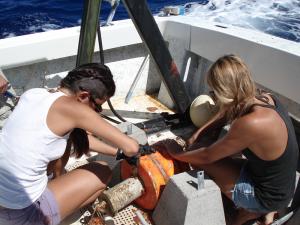Marine Biology graduate degree program gets green light
To be administered by College of Natural Sciences, School of Ocean and Earth Science and Technology
University of Hawaiʻi at MānoaOutreach Coordinator, School of Ocean and Earth Science and Technology
Tim Tricas, (808) 956-8677
Professor, Zoology & Hawaii Institute of Marine Biology
The establishment of the first graduate degree program in Marine Biology in Hawai’i has been approved by the UH Board of Regents. The Marine Biology PhD and Master of Science Program will be jointly administered by the College of Natural Sciences (CNS) and School of Ocean and Earth Science and Technology (SOEST) at UH Mānoa.
Strongly supported by Deans William Ditto of CNS and Brian Taylor of SOEST, the graduate program in Marine Biology will train future leaders in the marine biological sciences. These include fisheries, coral reef biology, marine ecology and evolutionary genetics, marine biosensory and physiological processes, and marine resources management as they relate to tropical marine life and systems.
The program addresses state and national workforce needs, anticipating the demand for scientifically trained leaders who can identify, investigate and solve problems related to ocean and coastal resources. Specifically, the program will provide advanced professional training in Hawai’i and help to meet the need for technically trained scientists, policymakers, and mid-level managers in both public and private sectors. Additionally, the program will prepare future college-level faculty for entry into the rapidly expanding field of marine ecosystem research.
There has been a consistently high demand by incoming graduate students for training in marine biology. Fortunately, UH Mānoa is uniquely positioned to excel in offering a graduate program in Marine Biology. In addition to an abundance of research opportunities and infrastructure, UH Mānoa is situated in the Hawaiian Archipelago, which contains the largest coral reef habitats in the U.S. and one of the largest marine refuges in the world. The coastal and open waters surrounding the archipelago provide a natural laboratory for the study of marine ecosystems, marine geochemical processes, reef and oceanic fisheries, and human-marine interactions.
Previously, the only official academic opportunity in this field at UH Mānoa was a specialization in marine biology offered as a supplement to a graduate degree in Microbiology, Oceanography, Botany or Zoology.
The Marine Biology program will have provisional status until a required review is conducted during the 2017-18 academic year.

